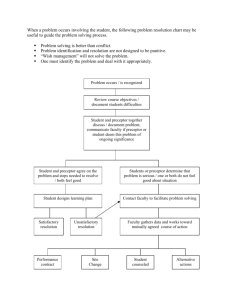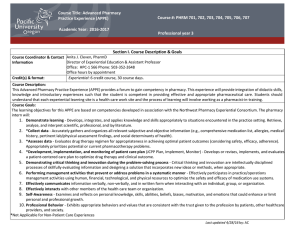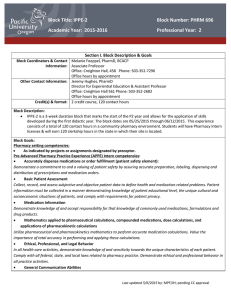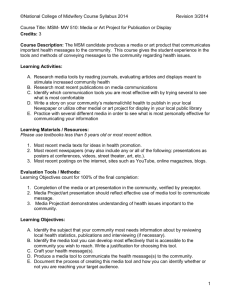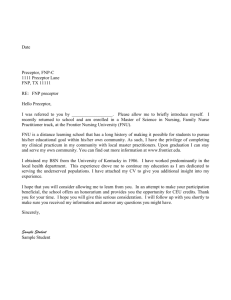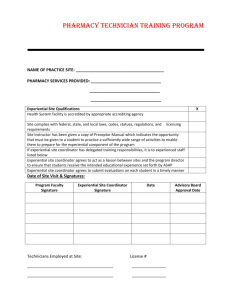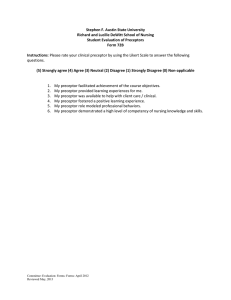Block Title: IPPE-3 Block Number: PHRM 697 Academic Year: 2015-2016
advertisement
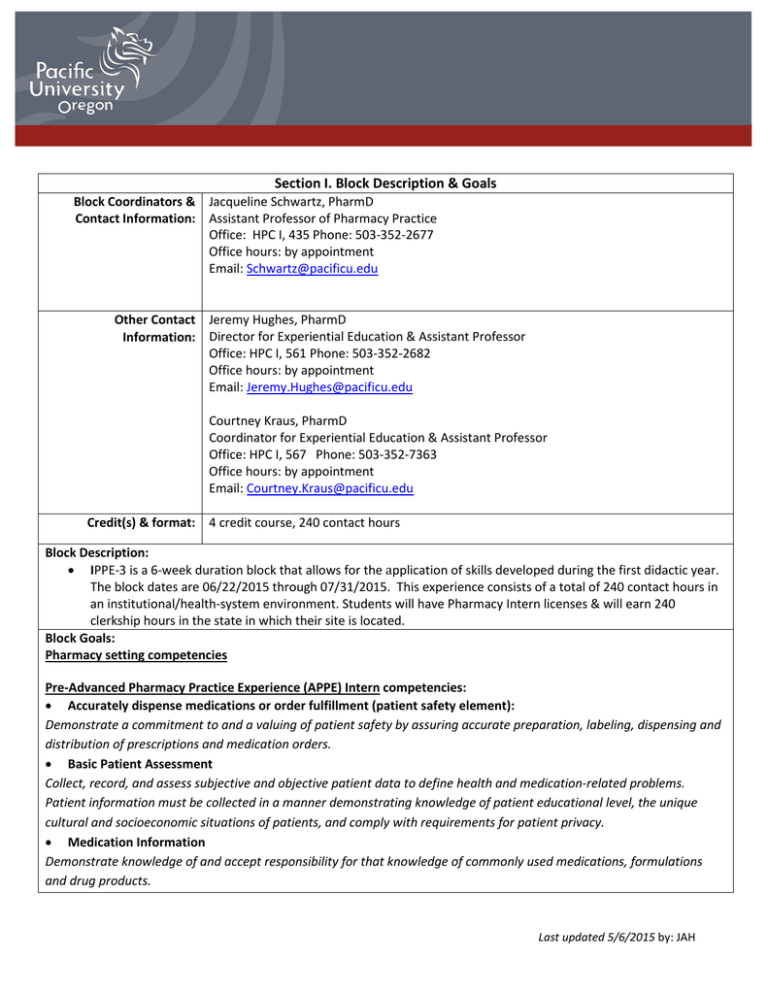
Block Title: IPPE-3 Block Number: PHRM 697 Academic Year: 2015-2016 Professional Year: 2 Section I. Block Description & Goals Block Coordinators & Jacqueline Schwartz, PharmD Contact Information: Assistant Professor of Pharmacy Practice Office: HPC I, 435 Phone: 503-352-2677 Office hours: by appointment Email: Schwartz@pacificu.edu Other Contact Jeremy Hughes, PharmD Information: Director for Experiential Education & Assistant Professor Office: HPC I, 561 Phone: 503-352-2682 Office hours: by appointment Email: Jeremy.Hughes@pacificu.edu Courtney Kraus, PharmD Coordinator for Experiential Education & Assistant Professor Office: HPC I, 567 Phone: 503-352-7363 Office hours: by appointment Email: Courtney.Kraus@pacificu.edu Credit(s) & format: 4 credit course, 240 contact hours Block Description: • IPPE-3 is a 6-week duration block that allows for the application of skills developed during the first didactic year. The block dates are 06/22/2015 through 07/31/2015. This experience consists of a total of 240 contact hours in an institutional/health-system environment. Students will have Pharmacy Intern licenses & will earn 240 clerkship hours in the state in which their site is located. Block Goals: Pharmacy setting competencies Pre-Advanced Pharmacy Practice Experience (APPE) Intern competencies: • Accurately dispense medications or order fulfillment (patient safety element): Demonstrate a commitment to and a valuing of patient safety by assuring accurate preparation, labeling, dispensing and distribution of prescriptions and medication orders. • Basic Patient Assessment Collect, record, and assess subjective and objective patient data to define health and medication-related problems. Patient information must be collected in a manner demonstrating knowledge of patient educational level, the unique cultural and socioeconomic situations of patients, and comply with requirements for patient privacy. • Medication Information Demonstrate knowledge of and accept responsibility for that knowledge of commonly used medications, formulations and drug products. Last updated 5/6/2015 by: JAH Block Title: IPPE-3 Block Number: PHRM 697 Academic Year: 2015-2016 Professional Year: 2 • Mathematics applied to pharmaceutical calculations, compounded medications, dose calculations, and applications of pharmacokinetic calculations Utilize pharmaceutical and pharmacokinetics mathematics to perform accurate medication calculations. Value the importance of total accuracy in performing and applying these calculations. • Ethical, Professional, and Legal Behavior In all health-care activities, demonstrate knowledge of and sensitivity towards the unique characteristics of each patient. Comply with all federal, state, and local laws related to pharmacy practice. Demonstrate ethical and professional behavior in all practice activities. • General Communication Abilities Demonstrate effective communication abilities in interactions with patients, their families and care givers, and other health care providers. Communication should be consistent with education level, cultural issues, and empathy. Elicit feedback validating understanding of communication. • Drug Information Analysis and Literature Research Assess information needs of patients and health providers and apply knowledge of study literature analysis, including study design and retrieval, to provide accurate, evidence-based drug information. • Health and Wellness – Public Health Know and apply principles of health and wellness in the provision of individual and population-based health and wellness information. Integrate unique characteristics of individuals and populations in the design of health and wellness information. • Insurance /Prescription Drug Coverage Utilizing knowledge of a wide array of private and public health insurance options assist patients and care givers to obtain their medications and related para-pharmaceuticals in an affordable manner that meets their health care needs. • Interprofessional Health Care Team Understand the roles and responsibilities of all members of the health care team and interact with them appropriately. • Medication Use Systems Understand the various medication use systems across practices of pharmacy. Professional competencies: • Student is empathic Demonstrates appreciation of others’ positions; attempts to identify with others’ perspectives; demonstrates consideration towards others. • Student behaves in an ethical manner Acts in patients’ best interests; acts in accord with the profession’s and/or practice site’s code of ethics. • Student communicates articulately Clearly communicates thoughts; uses appropriate terminology and vocabulary for intended audience. • Student is punctual Arrives at practice site and meetings early or on time; meets deadlines for completion of tasks and responsibilities. • Student maintains confidentiality Engages in discussions or other activities involving patient- and/or site-specific information for purposes of fulfilling Last updated 5/6/2015 by: JAH Block Title: IPPE-3 Block Number: PHRM 697 Academic Year: 2015-2016 Professional Year: 2 professional responsibilities only; maintains confidential nature of patient- and/or site-specific documents. • Student is respectful Demonstrates regard for patients, superiors, colleagues, other personnel, and property; acts in a manner that shows recognition that he/she is a guest at the practice site as a professional student. • Student demonstrates accountability Holds oneself liable for tasks/duties/responsibilities that he/she is responsible; does not blame others for mistakes or mishaps, nor avoids responsibilities. • Student accepts and applies constructive criticism Responds openly and positively to feedback; modifies behavior if necessary. • Student wears appropriate attire Adheres to dress code (written or unwritten); attire is acceptable to practice setting. • Student demonstrates confidence Acts and communicates in a self-assured manner, yet with modesty and humility. Block Attendance Requirements: • Student must complete a minimum of 240 contact hours during the 6 week course. Students are required to participate during all six weeks. A minimum of 40 hours per week of direct activity is required to pass the course, but no more than 48 hours per week of direct activity. Hours in excess of the minimum should be anticipated as these are considered part of your professional responsibility. The schedule that is set by the preceptor may vary from the “normal 9-5:30 shift”. For example, the schedule may include evening/night/weekend hours. Weekly hours do not carry forward to subsequent weeks. A student should recognize that missed attendance during the IPPE-3 rotation may be grounds for a No-Pass (NP) grade, as determined by the block coordinator. Students will work the shift/hours assigned by the preceptor. Policies: • The School and University policies concerning academic integrity and dishonesty, as well as student conduct are described in the Pacific University School of Pharmacy (SOP) Student Handbook and the Experiential Manual. These Handbooks incorporate School policy with University policy to ensure the proper handling of all academic, professional, and experiential issues faced by students. Requirements to Pass This Block: At the Practice Site: • • The student must complete all preceptor specific assignments. The type, topic, and due date will be determined in conjunction with the preceptor within the first two weeks of the experience. Assessment of the project(s) will be completed by the preceptor. The School must receive the following assessments within three business days of completion of this IPPE. If these assessments are not received by the School within three days of completion of this IPPE, an incomplete will be assigned, which will result in a delay in student financial and academic progress. o Student assessment of preceptor Last updated 5/6/2015 by: JAH Block Title: IPPE-3 Block Number: PHRM 697 Academic Year: 2015-2016 Professional Year: 2 Student assessment of site/experience It is the student’s responsibility to make sure that the preceptor has completed and submitted both midpoint and final evaluations. Rotation hours logging: document hours on a daily basis. A passing grade on the student’s Final Evaluation indicates the student has accomplished 240 hours of rotation time during this block. The School uses a “Pass” (P)/“No Pass” (N)/”Incomplete” (I) system of recording student achievement. Assessment will be completed as outlined in the Experiential Manual. As stated in the Experiential Manual, it remains to Pacific University School of Pharmacy to award a final grade for each experience. The School reserves the right to remove a student from an experiential site at any time if there is a concern for patient safety or any inappropriate professional or ethical behavior. If a student receives a score of No Pass for any of the IPPE courses, the student may be granted the opportunity to remediate that block, if approved by the Student Promotions Committee. Remediation will be allowed as outlined in the Experiential Manual. Failure to pass the block a second time will result in removal from the program. The Student Promotion Committee examines exceptions to this policy on a case-by-case basis. o o • • • Asynchronous didactic online learning bridges: • There are five required activity themes with associated quizzes that must be completed during the experience o The student should discuss these with the preceptor at the beginning of the experience and attempt to integrate this learning in to day-to-day practice (when possible) Reflective journal writing (RJW) • Reflective journal writing (RJW) allows students to participate in deeper thinking and metacognition. An electronic student portfolio system provides the infrastructure necessary to collect evidence of both the process and products of learning. RJW is required for all experiential courses. RJW is considered part of the portfolio system. Other requirements may include uploading other assignments, rubrics, preceptor feedback, etc., as determined by the course coordinator. Portfolios will be subject to periodic audit to ensure completeness. Complete portfolios are required for successful completion of the program. • Each week, there are different questions to respond to, based on learned themes. At the end of weeks 3 and 6 the reflection is replaced by the midpoint and final evaluations, respectively. Recommended Textbooks, Materials & Electronic Resources: • Readings as selected and posted by instructor(s). • Electronic resources available via Pacific University library website: • Pacific University School of Pharmacy Experiential Manual Block Changes: • The provisions of this Block Syllabus may be added to, deleted from, or changed, if, in the opinion of the Block Coordinator, it becomes necessary to do so to achieve block objectives. The students and curriculum committee will be notified in advance of any such changes. Last updated 5/6/2015 by: JAH Week 1 Week 2 Week 3 Week 4 Week 5 Week 6 Block Title: IPPE-3 Block Number: PHRM 697 Academic Year: 2015-2016 Professional Year: 2 Monday 22 June Tuesday 23 June Wednesday 24 June Thursday 25 June Friday 26 June Monday 29 June Tuesday 30 June Wednesday 1 July Thursday 2 July Friday 3 July Monday 6 July Tuesday 7 July Wednesday 8 July Thursday 9 July Friday 10 July Monday 13 July Tuesday 14 July Wednesday 15 July Thursday 16 July Friday 17 July Monday 20 July Tuesday 21 July Wednesday 22 July Thursday 23 July Friday 24 July Monday 27th July Tuesday 28 July Wednesday 29 July Thursday 30 July Friday 31 July Required Activity 1 Required Activity 2 Medical Terminology 1 Medical Terminology 2 Week 1 Labs 1 Labs 2 Week 2 Health-system Medication Safety 1 Health-system Medication Safety 2 Week 3 Mid-point evaluation with preceptor Health-system Medication Reconciliation 1 Health-system Medication Reconciliation 2 Patient Case 1 Patient Case 2 General Quiz Optional Activities See IPPE3 manual for suggestions, or your preceptors may have specific activities they would like you to do Reflection Week 4 Week 5 Final evaluation with preceptor Last updated 5/6/2015 by: JAH
